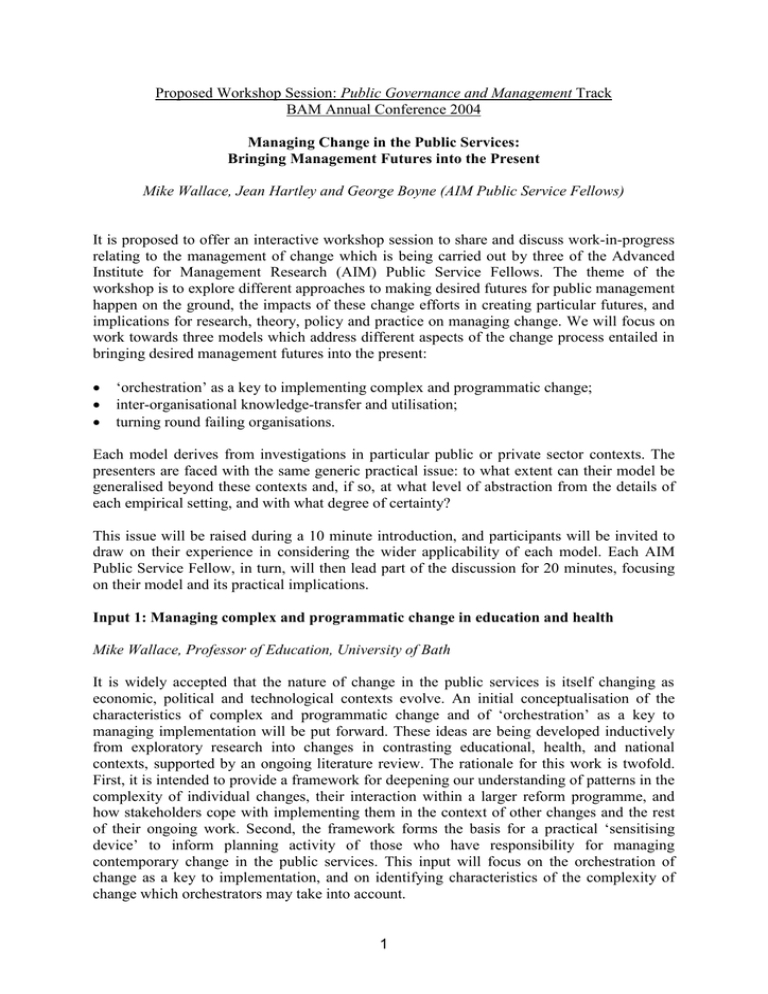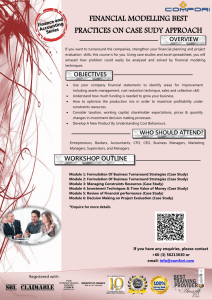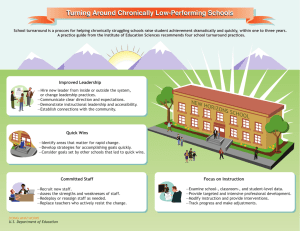Public Governance and Management BAM Annual Conference 2004
advertisement

Proposed Workshop Session: Public Governance and Management Track BAM Annual Conference 2004 Managing Change in the Public Services: Bringing Management Futures into the Present Mike Wallace, Jean Hartley and George Boyne (AIM Public Service Fellows) It is proposed to offer an interactive workshop session to share and discuss work-in-progress relating to the management of change which is being carried out by three of the Advanced Institute for Management Research (AIM) Public Service Fellows. The theme of the workshop is to explore different approaches to making desired futures for public management happen on the ground, the impacts of these change efforts in creating particular futures, and implications for research, theory, policy and practice on managing change. We will focus on work towards three models which address different aspects of the change process entailed in bringing desired management futures into the present: ‘orchestration’ as a key to implementing complex and programmatic change; inter-organisational knowledge-transfer and utilisation; turning round failing organisations. Each model derives from investigations in particular public or private sector contexts. The presenters are faced with the same generic practical issue: to what extent can their model be generalised beyond these contexts and, if so, at what level of abstraction from the details of each empirical setting, and with what degree of certainty? This issue will be raised during a 10 minute introduction, and participants will be invited to draw on their experience in considering the wider applicability of each model. Each AIM Public Service Fellow, in turn, will then lead part of the discussion for 20 minutes, focusing on their model and its practical implications. Input 1: Managing complex and programmatic change in education and health Mike Wallace, Professor of Education, University of Bath It is widely accepted that the nature of change in the public services is itself changing as economic, political and technological contexts evolve. An initial conceptualisation of the characteristics of complex and programmatic change and of ‘orchestration’ as a key to managing implementation will be put forward. These ideas are being developed inductively from exploratory research into changes in contrasting educational, health, and national contexts, supported by an ongoing literature review. The rationale for this work is twofold. First, it is intended to provide a framework for deepening our understanding of patterns in the complexity of individual changes, their interaction within a larger reform programme, and how stakeholders cope with implementing them in the context of other changes and the rest of their ongoing work. Second, the framework forms the basis for a practical ‘sensitising device’ to inform planning activity of those who have responsibility for managing contemporary change in the public services. This input will focus on the orchestration of change as a key to implementation, and on identifying characteristics of the complexity of change which orchestrators may take into account. 1 Input 2: Organizational Change through Knowledge Creation and Diffusion in Public Service Inter-Organizational Networks: a Model Jean Hartley, Professor of Organisational Analysis, and Lyndsay Rashman, Local Government Centre, Warwick Business School, University of Warwick For public service organisations, a major approach to innovation and improvement of services is through the diffusion of knowledge and good practices. There is increasing emphasis by the UK government and by local public service organisations on improvement through learning networks, peer review, and collaboratives. Research suggests that learning strategies and the methods to achieve knowledge transfer need to be adequately grounded in a theory of knowledge management and the means to apply learning within the organization. However, such an evidence base for learning networks has still not been well established in the public sector. A model of inter-organisational knowledge transfer will be put forward which was derived from the literature and empirical research on the participation of English local authorities in the Beacon Council Scheme (as award holders or as learners through Beacons). We have identified some of the enabling conditions that support the processes of effective knowledge creation, transfer, distribution and application in local government. This work suggests that attention should be paid to the conditions that enable or support learning between authorities, the preparation by an organisation seeking to share or disseminate learning and the embedding of new understandings. Input 3: Strategies for Public Service Turnaround: Lessons from the Private Sector? George Boyne, Professor of Public Sector Management, Cardiff Business School, Cardiff University National policy makers and local service managers are striving to identify strategies to improve the performance of ‘failing’ public organisations. However, little academic research on public service turnaround is available to inform their efforts. By contrast, substantial work has been conducted on the reversal of decline in the private sector. A model of the turnaround process is being developed from this literature, and evidence on the effectiveness of different turnaround strategies is under review. The private sector evidence suggests that recovery from failure is associated with strategies of retrenchment, repositioning and reorganisation. The potential feasibility and impact of these strategies in the public sector is being evaluated. In this input, major research questions on public service turnaround will be identified. Conclusion The remaining workshop time will be given over to considering implications of the three inputs for understanding and managing change directed towards improving practice in the public services. 2



